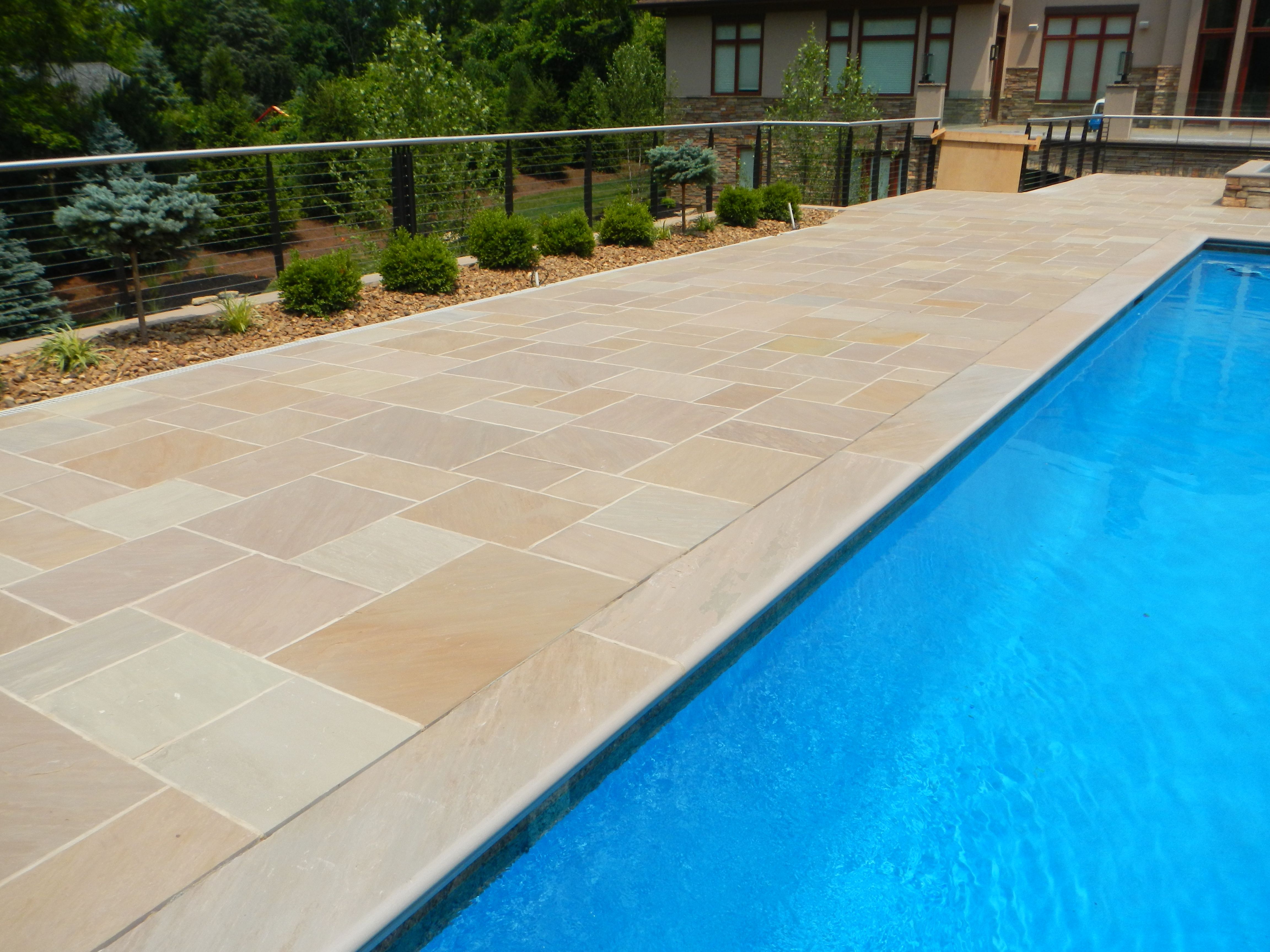
Have you ever thought about how to transform a barren outdoor space into a backyard paradise, a stylish entrance to a business, or an artistic flower garden? Pavers are the literal building blocks of an upgraded outdoor space. Also known as paving stones, they're flat surfaces that make up walkways, patios, pool decks, driveways, and other hardscaped areas that we use every day.
The best part is that the assortment of paver products available in the market provides an almost limitless range of design options for both home and business owners. From natural stones created through millions of years to engineered alternatives that can be crafted on-demand in any color and shape combination you can ask for, read on for some of the most common questions and answers about using pavers for a project on your property.
Our clients often come to us with questions about pavers and how to use them in their landscapes. There's a lot of information to digest on the subject so we sat down with Justin Alicandro, the Vice President of Natural Stone Product for InStone, a leader in the paver industry to chat about commonly asked questions. Check out what he had to say!
What are the different types of pavers?
There are basically two types of pavers: natural stone and manufactured pavers made from materials like concrete or brick. Manufactured pavers are usually less expensive and more consistent in size, color, and texture since they're made from the same molds. And it's super easy to produce more pieces should you need them in the future.
On the other hand, many people really love the look of natural stone pavers because each one is unique with its own natural movement and character, thanks to Mother Nature's personal touch. Plus, natural stone is super tough and can hold up against weight and weather better than concrete pavers. This means that it can last a long time and even help the resale value of your home.
So, which one is right for you?
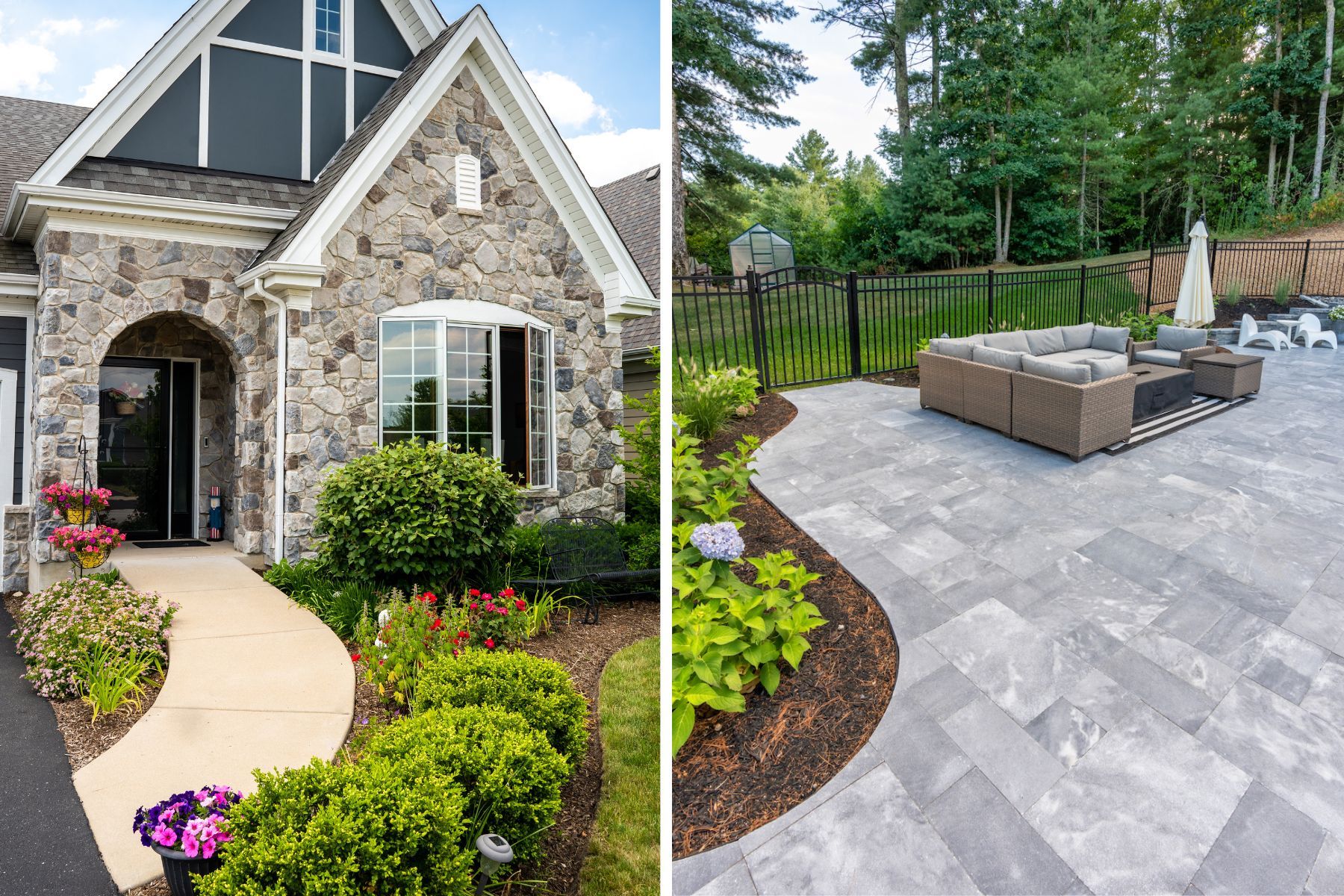
Is laying pavers a job I can handle myself?
When it comes to building a patio or other hardscaped area, it might seem like all you need to do is put some stones down and call it a day. But trust us, appearances can be deceiving. There's a lot of prep work that goes into creating a stable base for your pavers so that they will last for years to come.
Properly installing pavers is a labor-intensive and deceptively complicated process. That's why it's a smart idea to hire some pros to handle the job. They know how to excavate the area, grade it properly, and lay down a layer of crushed stone and sand with a permeable lining. This ensures that your patio will drain properly and the stones won't crack or sink.
And if you live in an area with harsh weather conditions like New England, it's especially important to get some expert advice.
"New England has the worst freeze and thaw cycles not only in the United States, but the entire world," said Instone New England Territory Sales Manager Jake Alicandro. "If your patio is retaining moisture when those cycles come around, it can cause stones to break. That's why the installation is so big – you don't want to take any shortcuts, especially with natural stone."
So take it from us, don't try to cut corners on installation. Talk to a skilled local hardscaper or contractor who can advise you on the best materials for your area and soil type. Have it done the right way the first time to avoid headaches down the road.
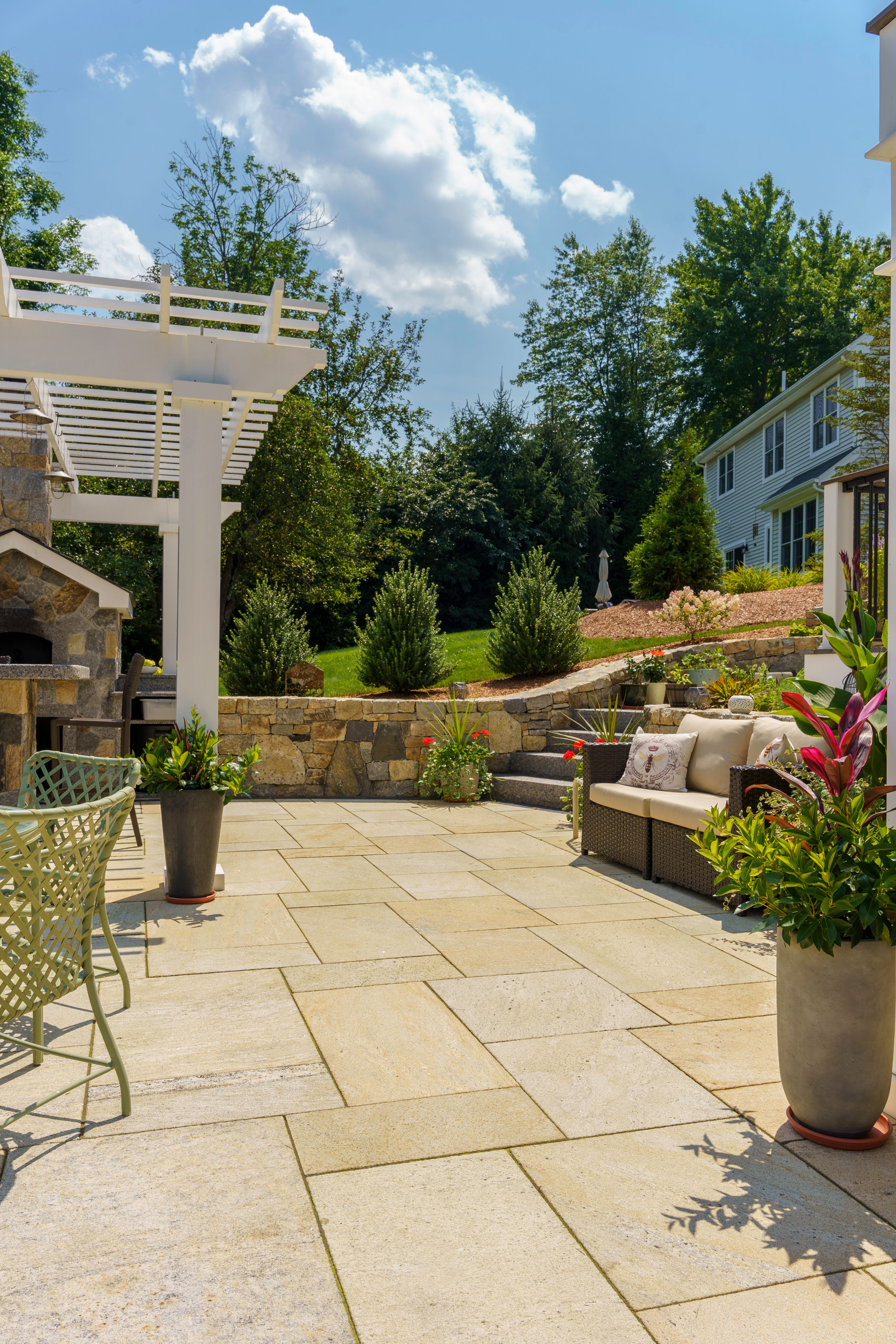
Can I mix and match different paver types and sizes?
Mixing and matching different paver types and sizes is totally doable and can add a unique touch to your project. Whether you go for a uniform look with pavers of the same size and shape, or a multi-piece pattern with pavers in various sizes that fit together, it all depends on your personal style. If you're looking to create a rustic feel, Irregular pavers (also known as irregular flagging or irregular stones) that vary in shape and size can give you that effect.
Designers often like to mix two or more different types of stone for a more striking visual contrast. Combining stones with neutral tones and stones with brighter colors can make the latter stand out and give your hardscape a pop of color. Plus, certain color combos can evoke different vibes depending on your region. In the Northeast, a mix of grey granite and blue-toned stones creates a timeless look, while in the Southwest, buff-colored stones with pink and brown tones have a more native feel. So, feel free to get creative and mix it up with your paver types, colors, and sizes!
How do you maintain pavers & keep them clean?
Taking care of your pavers can vary depending on your specific property and where you decide to put them. Some staining and moss growth can build up over time, thanks to the dirt and organic matter that the wind and rain will naturally carry on your patio. A professional power washer can often restore pavers to their original glory with a simple cleaning, but use caution when pressure washing, start out slow on low power to prevent damage. (Note: If you choose to do it yourself, be sure to consult your dealer about the right cleaning solutions for your materials to avoid damage.)
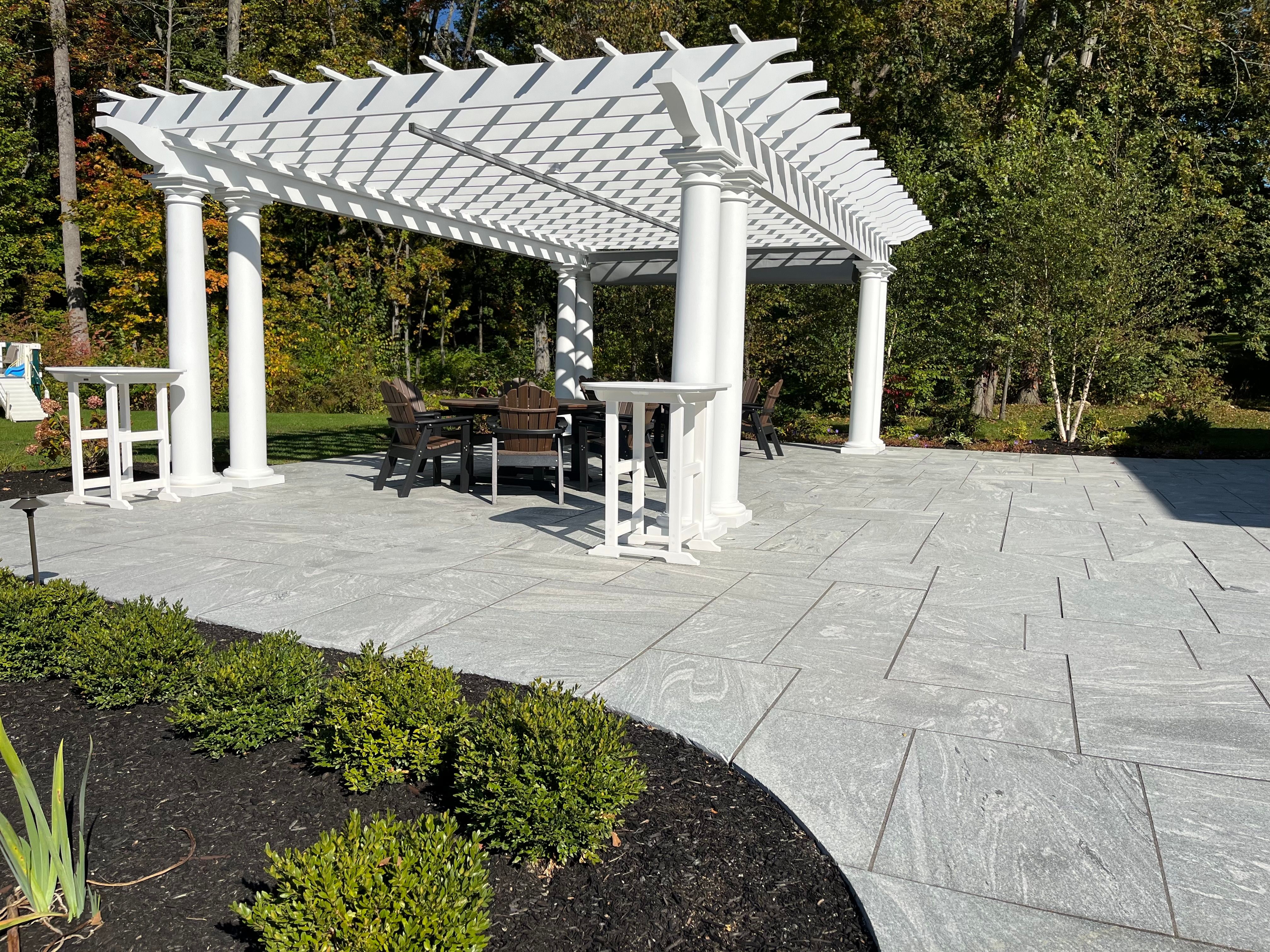
What advantages does a paver patio have to a traditional wood deck?
When it comes to choosing between a paver patio and a traditional wood deck, there are some key factors to consider. While wood decks can be a classic and cozy addition to your home, they can come with some drawbacks.
One of the main issues with some types of wood is that it's prone to moisture retention, which can lead to structural damage and color loss. Temperature changes can also cause wood to expand and contract, which can weaken it over time. Wood is also susceptible to rot, pest infestations, and the growth of plants and lichen, which can make it less durable in the long run.
Paver patios offer a sturdy and low-maintenance alternative that can withstand the elements, all while adding value to your home.
"Generally, a patio made out of stone, especially natural stone, is going to hold up a lot better and a lot longer," Instone’s Alicandro said. "You can have a well-built deck that only holds up for 15 years, but I know people with natural stone patios that have held up great for decades."
How long can you reasonably expect pavers to last?
Good news: With proper installation, pavers can last a long time. Of course, durability can depend on various factors, including the type of pavers you choose and the level of wear and tear they will endure. But, for example, in New England, where granite is king, you can find walkways that have been around for over a century. So, with the right materials and installation, your pavers can continue to look great for many years to come.
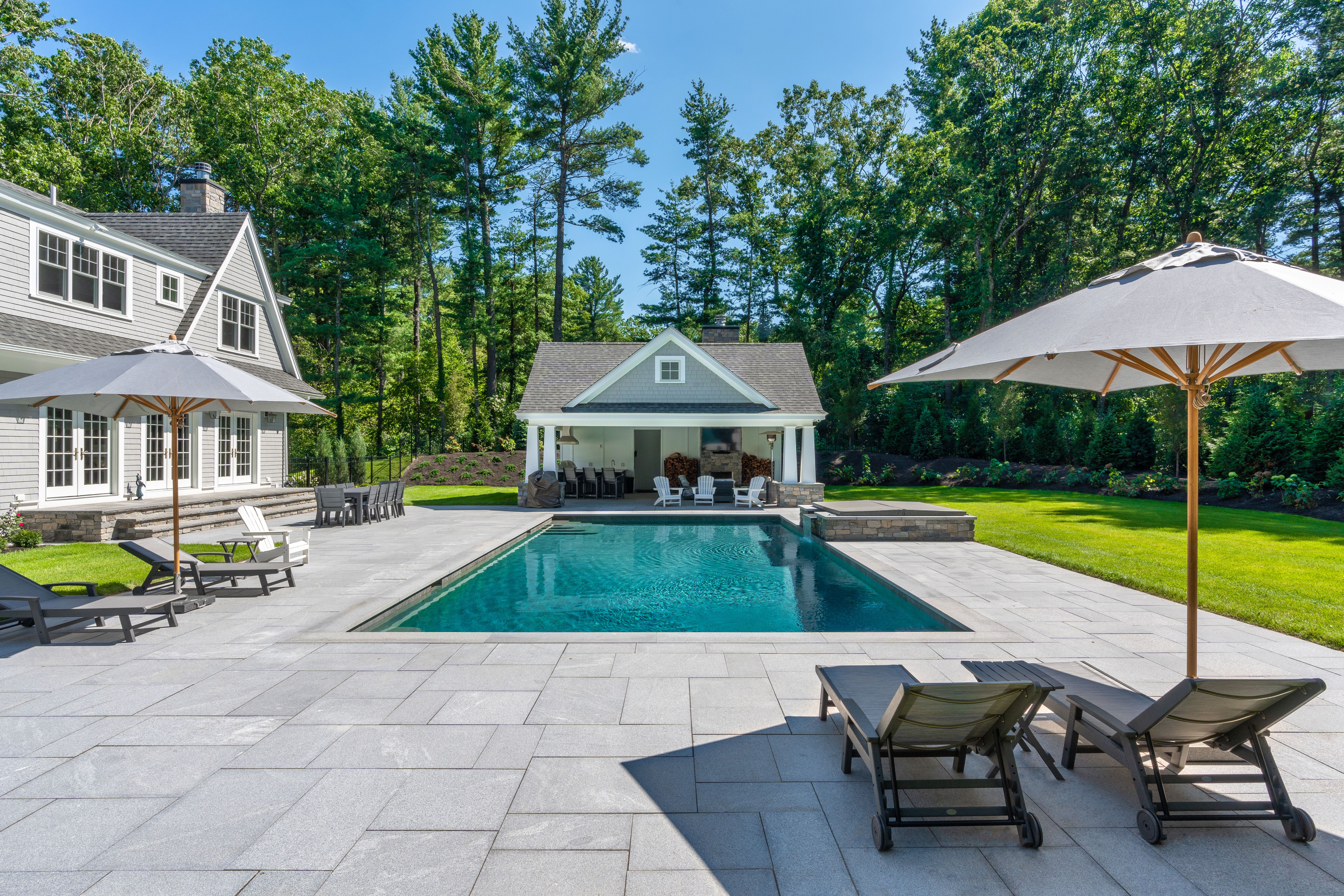
What kinds of pavers are best for pool areas?
When it comes to choosing pavers for your pool area, it's important to consider both function and aesthetics. You want something that looks great and provides a safe surface for your family and friends to enjoy.
One key factor to consider is the finish of the pavers. For pool areas, a thermal finish is a popular choice, as it provides a textured surface that helps prevent slips and falls. A bullnose edge can also be a smart choice to prevent any knee-scraping mishaps.
Certain stone types, including sandstones, granites, marble, and travertine, are all excellent choices for pool areas. Not only do they look great, with coping that compliments it, but they also don't absorb as much heat as other materials, which can make them more comfortable to walk on with bare feet. And don't forget about color: Lighter tones tend to stay cooler and can make your pool area feel more inviting on hot summer days.
What are the most popular kinds of natural stone used for pavers?
There are several types of stone that are commonly used in outdoor home projects. Some of the most popular include:
Granite
A hard and durable stone that is also often used for outdoor countertops, fire pits, and other outdoor features.
Limestone
A versatile stone that can be used for a variety of outdoor projects, including walls, walkways, and garden paths. It is available in a range of colors and textures.
Sandstone
A popular choice for outdoor walls and flooring because of its natural look and durability.
Bluestone
A type of sandstone that is quarried in the Northeast, it is known for its blue-gray color and is often used for outdoor flooring and walls.
Flagstone
Known for its durability and natural look, it is often used for walkways.
Slate
A type of metamorphic rock that is often used for outdoor flooring and walls. It is available in a variety of colors and is known for its natural beauty.
River Rock
A type of smooth, rounded stone that is often used for landscaping projects, such as creating dry creek beds or lining garden beds
Travertine
Travertine has a naturally weathered look, is durable, long lasting and can withstand changing weather conditions. Typically the color swirls and waves throughout the stone.
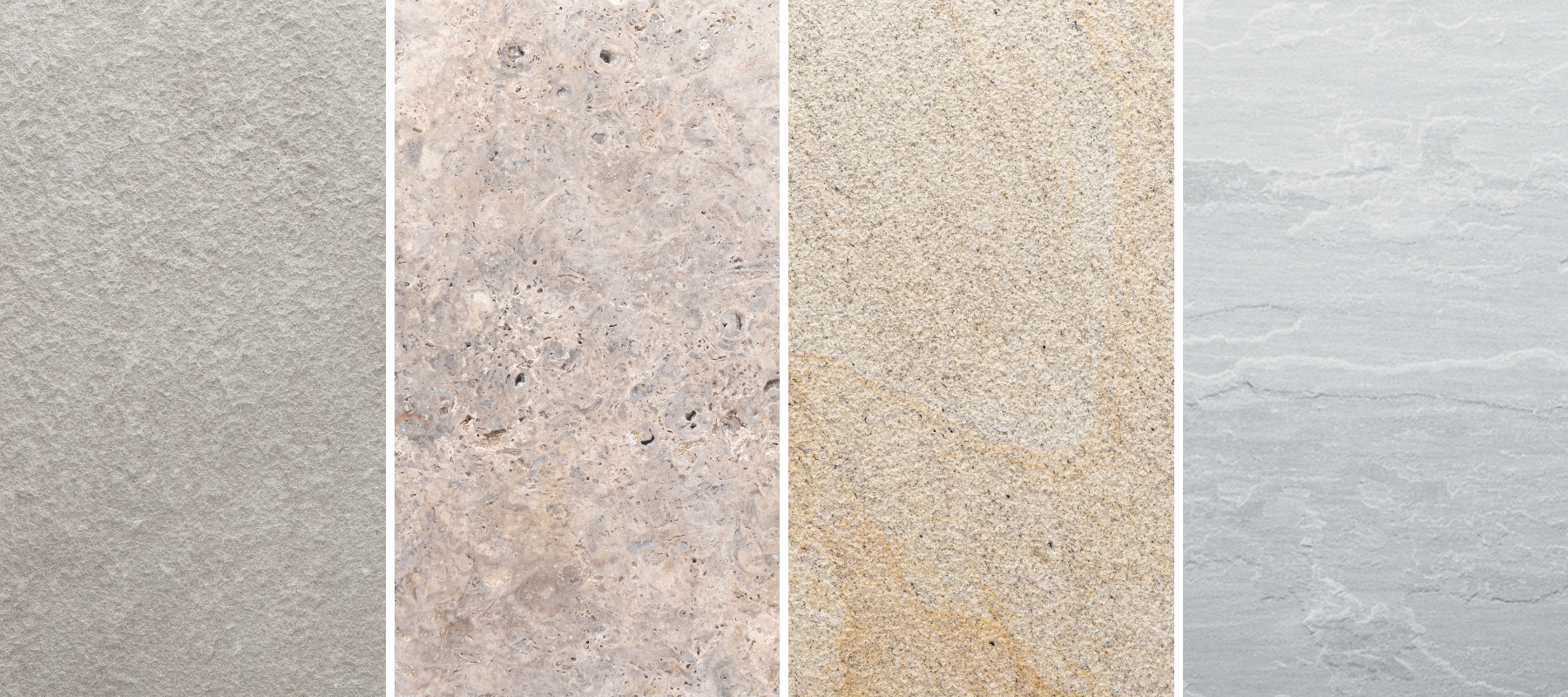
Are pavers eco-friendly?
Natural stone pavers are actually a great choice if you're looking for an eco-friendly option. Unlike other materials, natural stone products are sourced directly from the earth and are not harmful to the environment. Plus, there are ways to ensure that rainwater drains through the joints in patios and can recharge the ground below without damaging the pavers.
In addition, many of the industry's largest manufacturers are stepping up their investments in energy-efficient equipment and renewable energy production, like solar roof arrays, to make their operations more sustainable. And the waste product from trimming and grinding natural stone pavers can often be reused for other purposes, like the foundations for construction projects. Be sure to check the websites of paver manufacturers and retailers to learn more about their sustainability efforts.
I want pavers in my outdoor space. Where do I start?
Starting your paver project with a solid plan is key. With endless sources of inspiration available from home improvement TV shows, magazines, social media, and even Tilly, start envisioning what you want in your yard! Next up, work on a landscape design plan where you can look at your yard holistically and develop a plan that makes sense!
About Instone
Whatever color or style you need for your design, Instone provides everything from inspiration to the installation of your manufactured and natural stone veneer, landscaping stone, and masonry products. Instone is an experienced, professional wholesale distributor connecting customers to local dealers from a trusted network.
About Tilly
Tilly’s easy online landscape design process has been embraced by homeowners across the country and in Canada. Tilly breaks packages into the Front Yard, Backyard or your Full Yard. We match you with a professional landscape designer who is familiar with your region create the perfect custom plan for your outdoor space.
To start our process you’ll fill out a questionnaire about your property that helps our design team understand your goals, needs and existing landscape. You can add 3d renders, lighting plans or side yards to your design package. You’ll then “meet” with your designer on a video call, show them your space and discuss your priorities. Tilly also offers individual DIY projects, including a DIY Garden Bed if you aren’t ready to tackle your entire yard.
Whether you are just looking to add some curb appeal or transform your entire backyard… Whether you’re in Texas, Florida, Colorado or Illinois - we have a team for you!
Wherever you are in your yard journey, we can help.
Read more about: Landscape Design Tips